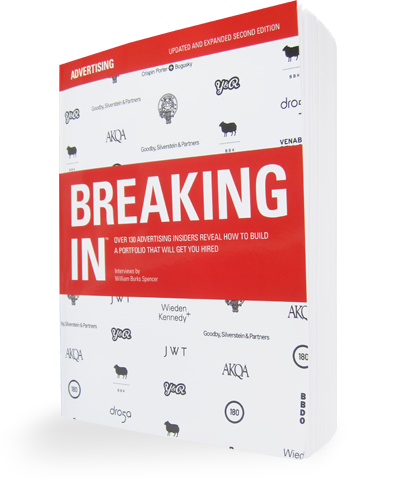Check out the work of Craig Davis.
What do you look for in a student or junior portfolio? And what impresses you?
I look for surprises. I look for the unexpected. I look for things I haven’t seen before. And I try to look behind the work as well and see what’s informed it. Because while the book is really, really important, I’d never hire someone on the strength of a book alone. I’m really interested in the person. I’m interested in why they’re doing what they’re doing. What drives them and what informs their work.
Is that something that you find comes through in the work?
Yes. It has to come through in the work. Advertising is a form of creative expression that’s created by someone, and there’s a signature to that which is individual. Or it should be. It’s fed by their curiosity.
When I say I’d never hire anyone solely on the strength of a book, the quality that I look for in the person behind the book is curiosity. The extent to which they are an adventurer or an explorer or a magpie, and they pick things up. They’re hungry to learn about stuff. Because in absence of that you’re just doing tricks and you haven’t got the raw material to work with. It’s really important that you have lots of stuff to play with in your own brain and assemble in ways that only you can do. That’s what makes a creative person and one different from the next.
[ … ]
Do you think writers need a long-copy campaign or some demonstration of writing?
Yes. I don’t think you can say you’re a writer if you can’t put a few hundred words together. I think it’s really important. And if you can’t, it speaks to your level of passion and commitment to your craft. I think the whole thing about people not reading anymore is rubbish. I think people read a lot. They might read on different devices, but they still read. So the ability to write and engage and inform and entertain is still relevant. Maybe you’re writing a script, so it’s not going to be read, it’s going to be performed and received by an audience live or via film, but the ability to write is still important for a copywriter. It’s fundamental.
What do you think about including things other than advertising in a portfolio?
I think that’s important. You can’t just be a creative person in the confines of the advertising industry, no matter how broadly you define advertising. If you’re a creative person, that’s not a nine-to-five job or an eight-to-six job—it’s a way of life. And I would think that really creative people want to find lots of ways to express their creativity and exercise those muscles. So things that they do that are noncommercial are completely legitimate. I like to see people who are passionate and driven and have enough in their system to get out that it manifests itself in other ways. So people are in bands. People have got art projects. People who illustrate or play with type or make films in their own time—I think that’s all relevant. And there was once a time when people would leave advertising to pursue something else. “I’m going to leave my job so I can write a screenplay” or “I’m going to leave my job so I can record an album or write a book,” and now I think your chances of making music or film or publishing are probably better inside the industry than out. In other words, all those forms of expression and kinds of content are high value inside the business now, so you don’t have to leave to do that. You can do it on the inside.
[ … ]
Can you think of any common mistakes that students make?
A lot of student books are superficial in their thinking. And that’s what I mean about looking for surprises. I look for connections, expressions, ideas I haven’t seen before. And when you’ve been around as long as I have, you’ve seen a lot of things. So I suppose I’m a bit harder to surprise. But most of the work you see is predictable rather than surprising. Sometimes it’s familiar or it’s just skimming across the surface. It’s not locked into anything that feels like it’s culturally significant or insightful from a human point of view or got any emotional grunt—it’s a quick gag that doesn’t leave you changed. And, to your question about art, I think the rules that apply to art apply to advertising, which is they have to leave you changed. They have to leave you affected. They have to create a legacy of some kind. So, to that extent, they are very similar. So that’s a common shortcoming.
Do you have any advice on how students should look for a job or get in touch with people like you?
[ … ]

Craig Davis

Comments are closed.